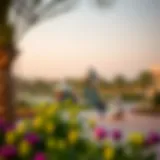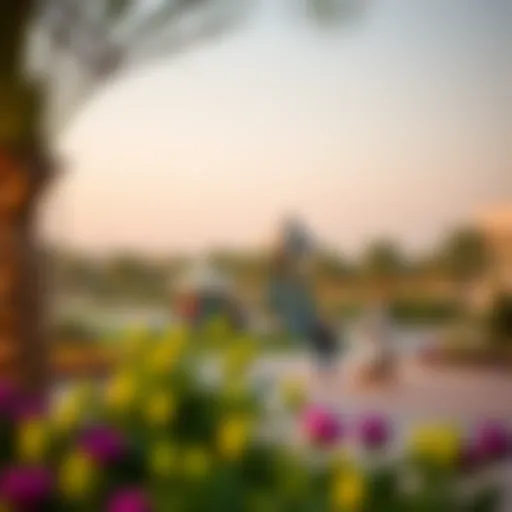Iftar Timing in Dubai: A Complete Guide
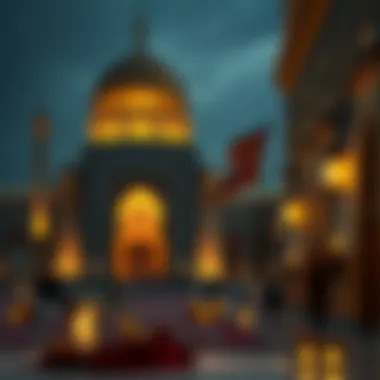

Intro
Ramadan is a sacred month for millions across the world, especially in Islamic cultures, marking a period dedicated to fasting, spirituality, and community. In cities like Dubai, this observance takes on unique local significance, intertwining cultural practices with modern living. The moment when the sun sets becomes pivotal, not simply marking the end of a day’s fast but also initiating a communal celebration known as iftar.
As the sun dips beneath the horizon, families and friends gather to break their fast, often in a lavish display of culinary delights. This communal meal is steeped in tradition, with each bite laden with flavors that echo the region's rich heritage.
To fully appreciate this ritual in Dubai, understanding the mechanics behind iftar timings is essential. These timings aren't arbitrary; they are dictated by astronomical calculations that consider the geographic setting of the Emirate. This guide delves into the nuances of iftar timing in Dubai during Ramadan, shedding light on its importance, the various dining options available, and the cultural aspects that shape the iftar experience.
Through this exploration, we aim to provide residents and visitors with a thorough understanding of what iftar entails in this vibrant city, making their experience during Ramadan enlightening and enjoyable.
Understanding Iftar
The concept of Iftar goes beyond mere meal times; it is a moment steeped in spiritual significance and cultural essence. In Dubai, as in many Islamic regions, Iftar marks the conclusion of a day of fasting during the holy month of Ramadan. The importance of understanding Iftar lies not only in its timing but also in its broader implications for the community, social interactions, and personal reflection.
Definition of Iftar
Iftar is defined as the evening meal with which Muslims break their fast during Ramadan. Traditionally, it begins with the consumption of dates and water, followed by a more substantial meal. This practice is rooted in the acts of the Prophet Muhammad, highlighting both physical and spiritual nourishment. By adhering to this practice, many find a deep sense of connection, not only to their faith but also to their community.
Cultural Significance
The cultural significance of Iftar in Dubai cannot be overstated. It's a time when families and friends gather, reinforcing bonds and creating a sense of unity. As sunset approaches, the excitement builds and the atmosphere shifts. Streets and homes come alive with the scent of delicious meals being prepared.
- Community Engagement: Local customs often involve public Iftar events, where individuals from different walks of life come together to share a meal. This practice fosters a spirit of togetherness and mutual respect.
- Charity and Giving: Ramadan is also a time for giving, and many take this opportunity to donate food and resources to those in need, ensuring that everyone has the chance to break their fast.
- Spiritual Reflection: For many, Iftar serves as a moment for reflection on the day’s successes and struggles during fasting. It prompts a sense of gratitude toward the blessings one has, reinforcing the core values of compassion and humility.
Drawing from these cultural practices, events can be seen across Dubai that emphasize the importance of community and spirituality. These aspects enrich the overall experience of observing Ramadan in the city. As such, understanding Iftar and its role helps illuminate the importance of spiritual and communal life for residents and visitors alike.
Iftar Timing in Dubai
Understanding the timing of iftar in Dubai during Ramadan is essential for both residents and visitors. It is more than simply checking a clock; it weaves together the spiritual, social, and cultural fabric of the community. Knowing when the fast is broken allows individuals to align with communal practices and rituals, providing a sense of belonging. The anticipation that builds throughout the day culminates in that moment when the call to prayer resonates, signaling it is time to gather with family and friends.
Calculation Methods
In Dubai, iftar timing is calculated based on precise astronomical data. Various Islamic authorities utilize astronomical calculations, taking into account the sunset which varies slightly daily. Each year, several local mosques and Islamic websites publish a calendar that contains the specific iftar times for each day of Ramadan. The essence of this determination lies in observing the Maghrib prayer, marked at sunset.
A common method involves the use of a sundial or more modern digital methods involving GPS technology to accurately measure the moment when the sun dips below the horizon. For practical purposes, many apps are available, like IslamicFinder, which updates daily fasting times based on geographical location. Additionally, local mosques often announce iftar times, adding a communal touch to the experience.
Variation Across the Month
The timing of iftar isn't static; it changes throughout the month of Ramadan. Early in the month, iftar occurs earlier as daylight diminishes, while toward the end, days are longer, pushing the timing later. For instance, at the beginning of Ramadan, the sun sets around 6:45 PM, but by the end, this can shift to around 7:00 PM or even later. This shift has significant implications for fasting practices.
Understanding this variation helps individuals plan their daily schedules effectively. People must know their iftar times for meal prep, social engagements, and daily routines. Moreover, it offers the chance to embrace changes and adapt, adding another layer to the experience of Ramadan. Tracking the time can facilitate greater mindfulness during the fast, enhancing spiritual reflection as each day unfolds differently.
“Knowing when to break fast builds anticipation and strengthens community bonds.”
Monthly Calendar
Understanding the monthly calendar is a pivotal aspect of navigating Ramadan in Dubai. Each day of this holy month carries distinct significance and rituals, making it essential for both those observing the fast and the non-fasting individuals in the community. The calendar marks key milestones and variations in iftar timings, shaping the overall experience of Ramadan.
Not only does it provide a day-by-day breakdown of iftar times, but it also presents important dates, allowing residents and visitors alike to partake in cultural and community events more effectively. Furthermore, staying informed about the daily changes in meal timings facilitates better planning, especially for families and friends gathering to break their fast together.
Iftar Times for Each Day
During Ramadan, iftar times are not static; they shift daily based on the setting sun. This variablity is calculated with precision, often using astronomical data or local mosques' announcements.
For instance, in early Ramadan, iftar may occur around 6:30 PM, while toward the end of the month, it might shift to around 6:45 PM or later. Such gradual changes reflect how daylight changes throughout the month. It is not uncommon for people to rely on mobile apps or local news outlets for the most accurate timings.
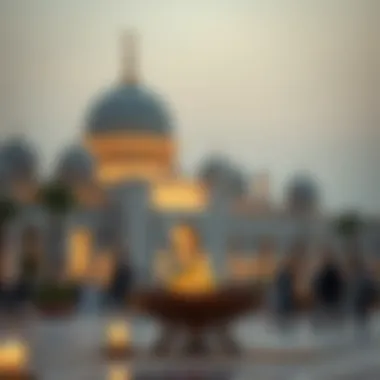

Considerations for families also arise, as younger children and older family members may have stricter adherence to the specific timing of the meal. Having a transparent monthly calendar can help alleviate concerns and ensure that everyone is on the same page, literally and figuratively.
Significant Dates During Ramadan
Certain dates during Ramadan have amplified significance within the Muslim community, acting as focal points for prayer and celebration. Events such as Laylat al-Qadr, or the Night of Decree, are celebrated in the last ten days of Ramadan, where many believe prayers hold extra merit. Observing iftar during this time becomes a deeply spiritual experience.
Another noteworthy date is Eid al-Fitr, marking the conclusion of Ramadan. This celebratory occasion transitions from fasting to feasting, bringing families and communities together. In Dubai, preparations for Eid often simmer beneath the surface of the month-long fasting, as shops and restaurants gear up for an influx of festive gatherings.
To summarize, the monthly calendar shapes the entire Ramadan experience. Keeping track of iftar timings, understanding significant dates, and participating meaningfully in cultural observances are crucial. This knowledge demystifies the month, offering both residents and visitors a lens through which to appreciate Ramadan in Dubai even further.
Impact on Daily Life
The timing of iftar significantly influences various aspects of daily life in Dubai during Ramadan. Not only does it alter work schedules and social interactions, but it also compels individuals to rethink their routines around meal preparation, leisure activities, and productivity. Understanding these impacts provides a clearer perspective on how the holy month transforms the fabric of everyday life in this vibrant city.
Changes in Work Hours
As the sun dips below the horizon signaling the end of the fast, many workers are met with a different rhythm to their daily grind. In Dubai, businesses often adjust their operations during Ramadan.
- Office Hours: Most workplaces tend to shift their start times later, often beginning around 9:00 AM or even later. This change accommodates employees who may not have had the chance to eat breakfast after a pre-dawn meal, known as suhoor.
- Shortened Days: Oftentimes, the working hours are curtailed to allow for a seamless transition into the evening's iftar. Employees frequently face an end to their workday around 3:00 PM or 4:00 PM, shortening the typical work week.
This adjustment helps facilitate a balance between work duties and observance of the fast, ensuring that both employees and employers experience Ramadan respectfully.
Effects on Dining and Social Activities
Social dynamics in Dubai during Ramadan are markedly different, particularly around dining and gatherings. As the clock approaches iftar time, streets and social venues come alive:
- Iftar Gatherings: Families and friends come together to break their fast, fostering community spirit. It's a common sight to see lavish iftar buffets offered in hotels and restaurants, where traditional dishes mingle with contemporary cuisine, reflecting the rich tapestry of Dubai's culinary landscape.
- Dining Out: Many non-fasting individuals or expats, intrigued by the spirit of the month, often participate in these gatherings, enhancing the city’s multicultural environment. Rituals like sharing dates and water before a meal symbolize a communal bond.
- Cultural Events: Restaurants and cafes host special iftar events, turning dining experiences into moments of cultural exchange. Festivals featuring live music or traditional storytelling to accompany meals invite both locals and visitors to engage in the joyous spirit of Ramadan.
Navigating these changes in lifestyle during the holy month not only highlights the importance of iftar but also enriches the community.
"Ramadan, a month when Dubai transforms, creates opportunities for connection and reflection."
The effects extend beyond just diet; they resonate through the cultural fabric, enhancing the essence of community and spirituality in this bustling metropolis. Thus, the timing of iftar leaves its mark on day-to-day interactions, shaping how individuals connect with each other and their culture during this sacred period.
Dining Options for Iftar
When Ramadan arrives in Dubai, there's a palpable shift in the city’s culinary landscape, and the choices for iftar dining are as diverse as the people who come together to break their fast. The importance of dining options during iftar stretches far beyond merely satisfying hunger; they serve as a backdrop for connection, community, and cultural expression. As families and friends gather around tables laden with food, the experience becomes a celebration of shared traditions and hospitality.
In this cosmopolitan hub, the options range from lavish buffets in luxury hotels to cozy local eateries, all aiming to create a memorable experience. It’s essential for both residents and visitors to understand these options, as they help foster a sense of belonging and serve as a bridge between cultures. From traditional Arabian fare to international cuisines, the dining scene during Ramadan in Dubai reflects the city's rich tapestry of cultures.
Popular Restaurants Offering Iftar
Dubai is home to a multitude of restaurants that offer tailored iftar menus, making each dining experience unique. Here are a few notable establishments that you might consider:
- Al Fanar Restaurant & Café: This restaurant is revered for its authentic Emirati cuisine, serving up dishes that evoke nostalgia for the old Dubai.
- Zheng He’s: Located at the Jumeirah Mina A'Salam, this Chinese restaurant offers a unique twist with its iftar menu that showcases a fusion of Asian flavors.
- Indego by Vineet: A fancy spot where guests can indulge in an upscale Indian iftar experience, complete with a contemporary touch.
- Pierchic: A stunning seafood restaurant perched on a pier offers a scenic view, especially during sunset, enhancing the iftar experience with a taste of luxury.
These restaurants not only focus on culinary delights but also on creating a warm, inviting atmosphere where the connection over food can flourish. It is quite common to see families and friends laughing and sharing stories, only pausing to enjoy the next mouthful.
"Food is not just what we eat; it’s a thread that weaves people together, especially during the holy month of Ramadan."
Traditional Dishes Served
Beyond trendy locations, there are timeless dishes that typically grace the iftar table in Dubai. These traditional foods embody the cultural heritage of the region and are often prepared with care.
Some items to keep an eye out for include:
- Dates: Traditionally, the fast is broken with dates, symbolizing the sweet renewal of energy.
- Luqaimat: These crispy, golden-brown dumplings drizzled with date syrup are a Ramadan favorite, often keeping families gathered around the table for seconds.
- Harees: A comforting wheat and meat dish, harees blends ingredients into a hearty meal that’s eaten with relish.
- Samboosa: These savory pastries filled with spiced meat or vegetables are perfect starters that complement the iftar meal.
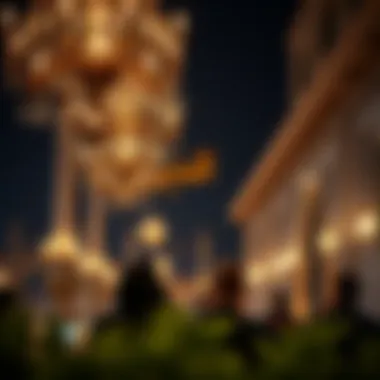

In these culinary experiences, the emphasis lies not just on the food itself but on the stories and memories each dish can evoke—a legacy passed down through generations. In sum, the dining options during iftar in Dubai encapsulate the spirit of Ramadan, inviting everyone to partake in the joy of fasting and feasting, thus enriching both the body and the soul.
Community Events and Iftar Gatherings
In Dubai, community events and iftar gatherings represent not just an opportunity to break the fast, but also a moment to foster social connections amongst residents and visitors alike. This practice goes beyond the act of eating; it embodies the spirit of community, generosity, and traditions that define the month of Ramadan. The hosting of communal iftars strengthens the bonds between people, allowing for a sharing of cultures and experiences during this sacred time.
Organized Community Iftars
During Ramadan, many organizations, mosques, and community centers in Dubai come together to host organized iftar events. These gatherings serve as an open invitation for individuals and families, regardless of their backgrounds or beliefs, to share a meal and partake in the celebration of Ramadan.
The significance of these organized events lies in their ability to unite diverse groups. For instance, local mosques might hold iftar dinners in their courtyards, welcoming anyone to join in the festivities. Some large-scale events even take place in public parks or community halls, where hundreds can converge around tables laden with food.
Benefits of attending these communal iftars include:
- Cultural Exchange: Participants often learn about Ramadan traditions and the significance behind various dishes served, enhancing cultural appreciation.
- Building Relationships: These gatherings offer a chance to meet neighbors and forge new friendships, breaking down barriers between different communities.
- Support for Local Charities: Many iftars partner with charities, enabling attendees to support local causes while gathering together.
“Iftar is not just about food; it’s about sharing, caring, and coming together as one community.”
Charitable Contributions During Ramadan
Ramadan is a time for giving, and charitable contributions play a crucial role in the observance of the month. Many organizations in Dubai emphasize the importance of generosity during this holy period, making it a tradition to encourage donations and support for those in need.
During organized iftar events, individuals often have the opportunity to donate money, food, or essential supplies. Local charities frequently hold drives that align with iftar gatherings, aiming to distribute meals to less fortunate families. This not only ensures that those who may not have access to iftar can still partake but also reinforces the sense of community duty.
When considering charitable contributions in this context, it’s important to note the following:
- Transparency: Most community organizations emphasize ethical practices, ensuring that donations reach those who need them most.
- Collaboration with Local Businesses: Many iftar events are sponsored by restaurants or food suppliers, helping to make the gatherings both communal and charitable.
- Broader Impact: Contributions made during Ramadan extend beyond food; they often fund educational programs, healthcare services, and support systems for families in need.
In summary, community events and iftar gatherings in Dubai not only enhance the spiritual experience of Ramadan but also create a vibrant atmosphere conducive to unity and compassion. These gatherings remind us that it is the shared moments of togetherness that truly enrich the essence of this holy month.
Tips for Observing Fasting
Observing fasting during Ramadan in Dubai is not merely about abstaining from food and drink from dawn until sunset; it is also a profound spiritual endeavor that calls for both physical and mental preparation. Having practical tips helps ensure that individuals can embrace this sacred month while maintaining their health and well-being. Here, we’ll delve into hydration strategies, as well as nutritional advice, which can enhance the experience of fasting.
Hydration Strategies
Drinking enough water during the non-fasting hours becomes essential for maintaining energy levels and overall health during Ramadan. Here are some effective strategies to stay hydrated:
- Set a Water Intake Goal: Aim for at least 8 glasses of water between iftar and suhoor. This ensures your body is well-hydrated when the fasting hours begin.
- Limit Caffeine and Sugary Drinks: Beverages like coffee and sodas can lead to dehydration. Instead, opt for herbal teas or fresh juices, which can also provide nutrients.
- Eat Hydrating Foods: Incorporate fruits and vegetables with high water content, such as watermelon, cucumber, or oranges, into your meals. They not only help with hydration but also offer vitamins and minerals, which are important for your body.
- Avoid Salty Foods: Salt can increase thirst, so try to steer clear of heavily salted snacks during suhoor and iftar.
"Stay hydrated, and you’ll sail smoothly through your fasting days without feeling like you’ve been thrown to the lions."
Nutritional Advice During Suhoor and Iftar
The meals preceding and breaking your fast are crucial opportunities to nourish your body adequately. Consider these guidelines for both suhoor and iftar:
- Balanced Meal Composition: Ensure your suhoor is a balanced meal including complex carbohydrates (like whole grains), protein (such as eggs or yogurt), and healthy fats (like avocados or nuts). This combination can provide sustained energy throughout the day.
- Be Mindful During Iftar: It’s tempting to dive into a feast after a long day. Start with dates and water to gently ease your stomach back into digestion. Then, move on to lighter dishes before enjoying heavier ones.
- Focus on Fiber: Foods rich in fiber, such as lentils and whole grains, can aid digestion and help you feel fuller longer, which can ease the transition between fasting and non-fasting periods.
- Don't Rush Your Meals: Taking time to enjoy meals can prevent discomfort and allows your body to signal fullness, reducing the temptation to overeat.
- Post-Iftar Hydration: Continue to hydrate even after iftar. Drinking water and consuming fluid-rich foods throughout the night aids in recovery before resuming your fast the next day.
By integrating these hydration strategies and nutritional tips into your routine during Ramadan, not only can you uphold the tradition of fasting, but you can also preserve your health and well-being during this spiritually enriching month.
Health Considerations During Ramadan
The month of Ramadan is a significant period for Muslims around the world, marked by fasting from dawn until sunset. In Dubai, where the population is a rich tapestry of cultures and traditions, understanding health considerations during this month is essential. This section will delve into specific elements that can help ensure a healthy observance of fasting, addressing potential health concerns and the importance of seeking medical advice when needed.
Managing Health Concerns
Fasting has numerous spiritual benefits, yet it may also pose health risks, particularly for certain individuals. It is crucial to be proactive in managing health during this observance. Here are some important aspects that could help:


- Hydration: Between iftar and suhoor, it's vital to drink sufficient water. Aim for at least eight glasses. Consider hydrating foods like watermelon or cucumbers to supplement fluid intake.
- Balanced Diet: Iftar meals should include a mix of proteins, carbohydrates, and healthy fats. Instead of reaching for deep-fried treats, opt for grilled meats, whole grains, and plenty of vegetables.
- Physical Activity: Though it may be tempting to lounge after iftar, light exercise can help digestion and maintain fitness. Try walking after meals to keep your energy levels balanced.
- Monitoring Health: If you have underlying health conditions such as diabetes or hypertension, monitoring your blood sugar levels and blood pressure is crucial. Prepare to adjust your diet based on your doctor's advice.
"A well-rounded approach to fasting can make all the difference—listen to your body, and don’t ignore the signs it sends you."
Seeking Medical Advice
While managing health concerns is vital, sometimes professional advice is necessary. Here are key points to consider regarding seeking medical assistance:
- Consulting a Doctor: If you have a chronic condition or are on medication, it’s wise to consult your healthcare provider before Ramadan. They can provide tailored guidance that's safe.
- Nutritionists and Dietitians: Engaging a professional can help structure your meal plans around suhoor and iftar. They can suggest nutritious options and portion sizes that align with your fasting needs.
- Stay Informed: Be aware of signs that could indicate a health issue—dizziness, weakness, or significant irregularities in body functions during fasting should not be ignored.
In summary, health considerations during Ramadan can’t be overlooked if one aims for a fulfilling and joyous observance of this sacred month. By managing potential health issues actively and seeking appropriate medical guidance, individuals can enjoy Ramadan while maintaining their well-being.
Iftar for Non-Fasting Individuals
The observance of Iftar during Ramadan is not solely a practice for those who are fasting; it also encompasses a rich cultural experience that can deeply involve non-fasting individuals. Recognizing and participating in iftar events can enhance understanding and respect for the traditions that shape the local and broader Muslim community. This section delves into the significance and benefits of actively engaging with the iftar culture, while also outlining best practices for those who may not be fasting.
Etiquette and Respect for Cultural Practices
Understanding the nuances of cultural practices around iftar is crucial for non-fasting individuals. It is essential to approach such social gatherings with a sense of respect and reverence. Here are a few key points:
- Dress Appropriately: When attending an iftar event, especially in a traditional setting, dressing modestly is appreciated. Opting for long sleeves and avoiding overly revealing clothing goes a long way in showing respect.
- Timing Matters: Being punctual is a sign of respect. Arrive shortly before the call to prayer, known as adhan, to join the communal moment of breaking the fast.
- Participate Mindfully: If you’re not fasting, you can still participate in the meal. It can be seen as a gesture of support and solidarity. However, refrain from eating or drinking in front of those who are observing the fast until they have broken it.
- Mind Your Language: Be conscious of your conversations. Avoid topics that might feel too celebratory or casual; maintain a tone that recognizes the significant spiritual aspect of Ramadan.
By adhering to these practices, non-fasting individuals embody the spirit of Ramadan and help foster a more inclusive atmosphere for everyone involved.
Participating in Iftar Events
Participating in iftar gatherings offers non-fasting individuals a unique opportunity to bond with friends, family, and colleagues during Ramadan. Here are some benefits and ways to engage:
- Creating Community Connections: Engaging in iftar helps bridge gaps in understanding among different cultures. It fosters respect and friendship among various communities, whether they are based in Dubai or visiting.
- Contributing to the Meal: If you are invited to an iftar, consider bringing a dish or dessert to share. This not only shows goodwill but also enriches the communal experience of breaking the fast together.
- Learning Traditions: Iftar is not just about food but also about customs and traditions. Take the opportunity to learn about the prayers, history, and significance behind various dishes served during Ramadan.
- Charitable Acts: Many iftar events incorporate an element of charity. Whether it’s contributing food for those in need or participating in fundraising activities, being part of such initiatives can be immensely rewarding.
Connecting through food and tradition, iftar events allow non-fasting individuals to embrace the essence of Ramadan in a culturally rich context.
Ending
In wrapping up the exploration of iftar timing in Dubai, it becomes clear just how significant this practice is during Ramadan. Understanding the intricacies of iftar not only provides practical insights but also deepens one’s appreciation for its cultural relevance. As we reflect, there are several specific elements worth noting that weave the fabric of the iftar experience.
Firstly, the act of breaking fast at sunset symbolizes unity and family bonding. It is often a point where loved ones gather around the table, sharing not just food but also laughter and stories. This communal aspect of iftar fosters a sense of belonging within the diverse society of Dubai.
Secondly, it’s crucial to acknowledge how the timings impact daily life. Adjustments in work schedules and social activities alluded to earlier outline how integral iftar is to the urban rhythm during Ramadan. Recognizing these shifts offers insights for residents and visitors alike, making their experience more harmonious.
Moreover, the diverse dining options available during iftar highlight the melding of culture and cuisine in the emirate. From traditional dishes like dates and lentil soup to modern culinary innovation, Dubai serves as a melting pot for various tastes and traditions. This diversity during iftar not only satisfies hunger but also nourishes cultural exchange.
"The meals shared at iftar are more than just nourishment; they are moments of reflection, gratitude, and community."
In summary, the reflections drawn from the iftar experience in Dubai showcase rich cultural heritage and social dynamics. As the sun sets each evening, the call to break fast serves as a reminder of the significance of community, tradition, and resilience that defines Ramadan in this vibrant city.
Reflection on the Iftar Experience
The experience of iftar is multifaceted, shaped by individual beliefs and communal practices. Each sunset during Ramadan marks not just a time for physical nourishment but a moment to reflect on one's spiritual journey. For many, this is a time to reconnect with faith, often filling the air with the rich aromas of home-cooked meals and the sounds of laughter.
Dubai, with its cosmopolitan backdrop, allows for a unique encounter where different cultures meet over the iftar table. Family gatherings are often loud and joyful, reflecting a melting pot of traditions. As plates clatter and stories unfold, the essence of iftar becomes more than merely eating; it transforms into an enriching experience of shared heritage.
Looking Forward to Future Ramadans
As each Ramadan concludes, anticipation for the next one begins to grow. The season is marked by its own inherent lessons, creating a tapestry of memories that influence how individuals approach fasting each year. The build-up towards the future is as much about reflection as it is about aspiration.
Looking ahead, communities in Dubai usually take lessons learned from the recent fasting month to create even more inclusive experiences. Local gatherings become more vibrant, while new culinary ventures emerge, offering fresh takes on traditional dishes. For the expat community, each Ramadan provides an opportunity to engage more deeply with local customs, fostering mutual respect and understanding.
By embracing the spirit of Ramadan, Dubai not only manages to maintain deep-rooted traditions but also adapts them to fit a modern, globalized context. With each iteration of Ramadan, the ever-evolving relationship between the people and their cultural practices strengthens, enriching both lives and spirits.
Relevant Resources:
